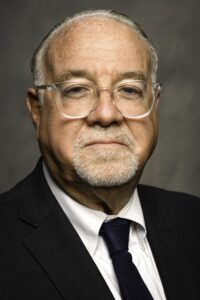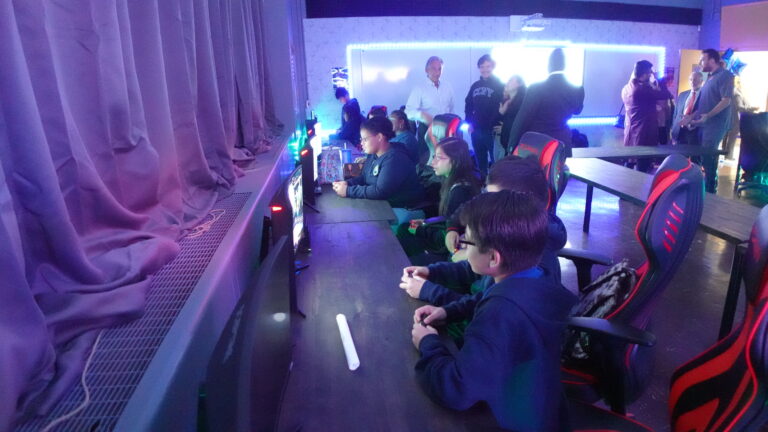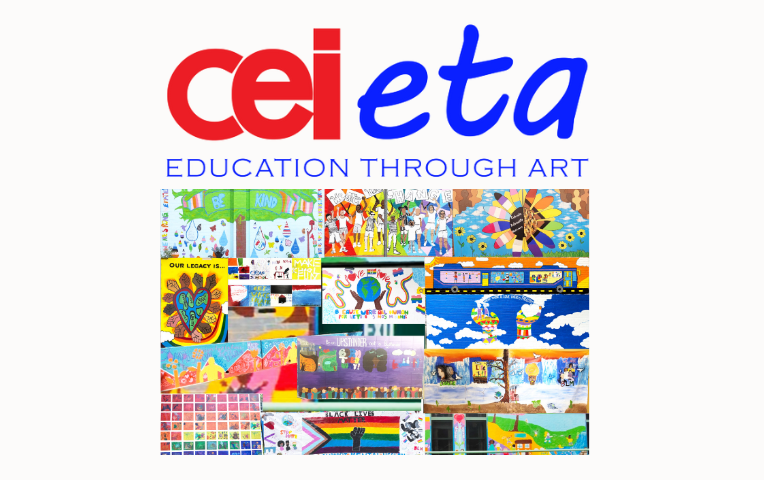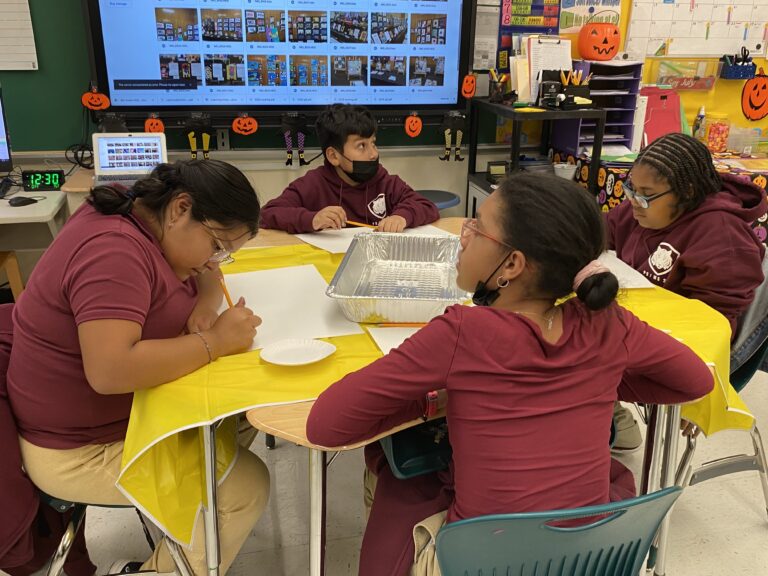

A message from the CEO
Dear CEI Family,
The beginning of the year is a perfect time to reflect on our positive impact in providing high-quality educational opportunities for all students. As we look forward to an exciting year ahead, it is also a good time to start something new. I’m pleased to share with you this inaugural issue of CEI Digest.
CEI Digest is a quarterly newsletter for you, our valued partner, providing a high-level overview of our
essential work. I know your time is important, so we will focus on the big picture. The Digest will share
stories, photos, and videos of our key events, initiatives, successes, and outcomes. You’ll read about
staff and students exploring unique educational opportunities. Most importantly, you’ll see firsthand
how your support of CEI helps students in under-resourced communities learn and grow.
Enjoy the first edition of the CEI Digest. Happy new year to you and your family.
Thank you for your continued support.

Sincerely,
Michael Kohlhagen
President and CEO, Center for Educational Innovation

Innovation Center At Summit Academy in Red Hook, Brooklyn
The first thing you might notice is the cool lighting. There is an unmistakable vibe at the Innovation Center at Summit Academy in Red Hook, Brooklyn. “We were very deliberate. We wanted to create a cool environment for the students,” said Jadd Schmeltzer, CEI, Director of Esports.
CEI worked with school leaders to transform a classroom into a competitive gaming facility, complete with bright lights, eight NextGen Xbox gaming systems, and Nintendo Switch consoles, sound panels and a green screen. The Innovation Center’s Gaming Facility launched in September with four middle school classes participating through an after-school program. One high school class also takes part through an elective credit for Esports curriculum.
“Some students have traditional sports, some have music, or theater. But we wanted to provide an outlet for students who don’t have any other connection to the school in any capacity,” Schmeltzer said. “This allows us to bring students together through a unique gaming experience.”
Principal Machael Spencer-Edwards agrees. He also says that video games are evolving to more than just a fun hobby. “This is a growing industry with many career paths for students to choose from,” Spencer-Edwards said. “This opens the door for students to get into the content creation side, the marketing side, the competition side.”
The CEI E-sports program consists of three components: Gaming, character education, and a college-to-career curriculum. Students also have an opportunity to learn from a pro. Vince Valerio is a former attorney who is now pursuing a career playing the basketball video game NBA 2K on a professional circuit. “He’s very high energy. He’s very passionate, and he gets the students excited about the possibilities of gaming,” Schmeltzer said.
The E-sports lab is just one aspect of the Innovation Center, which will later include a STEM, robotics and coding lab. CEI helped support the Innovation Center E-sports lab through a three-year $100k grant. We hope to replicate the Innovation Center in other schools across New York.
Drone Pilot Academy Taking Flight

Think of it as
the next generation of Driver’s Ed. Students and staff at Thomas A. Edison CTE
High School in Jamaica Hills, Queens, NY are launching an innovative Drone
Piloting Academy as part of the school’s Career and Technical Education
training. Students will be trained in drone piloting and autonomous flight
through coding to help prepare them for careers in this evolving technology.
“So many
industries are already using this technology from retail, to real estate, to
public safety,” said John Widlund, CEI Director of Career and Technical
Education. “We are excited to bring this cutting-edge opportunity to students.”
CEI will
provide 20 drones for each cohort of students. CEI has also coordinated with
leading industry experts and drone piloting professionals to work in tandem
with Edison teachers to provide the training. In addition to providing hands-on
skills in drone piloting and programming, the training will qualify students to
sit for the Federal Aviation Administration (FAA) Part 107 Exam—a remote pilot
certification. “Think of it as a CDL, a Commercial Driver’s License, for drone
pilots,” Widlund said.
According to
research by the consulting firm Market & Markets, companies across
industries will spend more than $16 billion on drones and drone services. This
will spark growth of the drone services market, creating 100,000 new jobs by
the year 2025.
“This is a
game-changer for our students,” said Edison principal Moses Ojeda. “Having
access to this technology, and learning the skills needed to pass the FAA exam,
opens up career paths that these students may not have thought possible.”
Each student
cohort will run approximately 20 sessions as an after-school program. The
Academy will use the Tello EDU drone which can be programmed in Scratch, Swift,
and Python. Students can even code to multiple drones programming them to fly
in a “swarm.” The software allows for beginners to use simply drag-and-drop
block coding, or advanced users to program in more complex codes. The school
will purchase the drones in January with plans to begin training during the
spring semester in February.
CEI Helps Schools Improve
The process of engaging in a comprehensive school review can be daunting, but necessary, for schools looking to improve their outcomes for students. Whether it is the Quality Review (QR) process in the NYC Department of Education or the Diagnostic Tool for School and District Effectiveness (DTSDE) process conducted by the NY State Education Department, CEI has become a “go-to” resource for schools in helping them “craft a school narrative” that demonstrates their strengths and highlights their positive outcomes. Schools that have already engaged with CEI in this process have shown demonstrable improvement and gained high marks on their formal city/state evaluations. As word of this spreads, more and more schools are lining up for our guidance.
Demand for help with the formal school review process has increased as New York City recently announced a pilot to reinstitute the QR process. It was suspended during the height of the pandemic. For this year only, schools must “opt-in” to the process which uses a revised QR rubric, measuring key performance indicators. Also, this newly revised rubric places an increased focus on equity and culturally responsive sustaining education.
CEI works with schools to walk them through a mock QR before their formal evaluation. With a team comprised of former QR reviewers and arbitrators, CEI conducts an “asset-mapping” exercise aligned to the 2022-2023 Quality Review Rubric to provide an in-depth analysis of school policies, priorities, and practices. “We can offer this to any school, anywhere,” said Virginia Connelly, CEI Executive Director of School Transformation. “We want to create a narrative for each school that maximizes the way they address each of the indicators under the QR components,” she added.
Ann Keegan is principal at P.S. 209 in the Bronx. She says CEI’s guidance prepared her school for the formal quality review. “CEI’s expert consultants really helped my team and I understand the dimensions of the QR, and how to demonstrate our school’s uniqueness and strengths in the best way possible. We were very happy with the results we achieved!”
Now CEI is working with additional schools across New York City on over all school improvement. In addition to mapping each school’s assets; CEI creates a step-by-step action plan for schools to capitalize on given strengths as well as to address areas of concern or in need of improvement. CEI consultants also make additional visits after the formal QR to assist school teams in reviewing feedback received from the QR, in monitoring implementation, and in making any necessary adjustments to the action plan.
“From under-performing schools that are struggling, to good schools looking to become great, we’re excited to work with any school that wants to improve,” Connelly said.
CEI Wins National Grant

Not all students learn in the same manner. This is particularly true for students with disabilities, some of whom have cognitive and social/emotional challenges. Teaching those students can also be a challenge– but CEI is here to help, having secured a national grant to train teachers in its seminal Education Through Art program.
The grant supports CEI Meridian, a professional learning program for teachers of K-5 self-contained classrooms of students with disabilities. Meridian uses a differentiated arts integration pedagogy and is designed to teach core content through two art modalities and presents six versions of all projects and materials; this enables teachers to differentiate instruction and address a wide range of student levels and abilities to meet the needs of a heterogeneous classroom.
The Education Through Arts program is effective because students naturally receive, learn and understand information and concepts in different ways through the senses. Students who are auditory learners may need to hear something to comprehend it, so those students may respond to teaching content through music, while visual learners who may need to see something to understand it may respond to using visual art as a conduit for teaching academics.
“The professional development we provide these teachers helps them better engage and instruct their students,” said Alexandra Leff, CEI Executive Director for Arts Education. “This grant helps us ensure children of all abilities have access to a high-quality education.”
Teachers are trained to use music and visual art to directly teach ELA (literacy) and MATH while strengthening social/emotional learning skills. In this way, students are learning the same core content through two art modalities, presenting alternative ways for students to learn the material and understand the concepts being taught.
The Assistance for Arts Education (AAE) grant is funded by the Department of Education’s Office of Elementary and Secondary Education.
P.S. 209, District 10, Joins CEI Community Schools Network

Center for Educational Innovation proudly welcomes P.S. 209, a Pre-K through second grade school located in the Bronx, to its network of community schools. CEI is a state-recognized Community Based Organization (CBO) serving new and existing community schools across New York and began working with P.S. 209 in December, 2022.
The State Education Department defines Community Schools as an equity strategy to organize resources and share leadership so that academics, health, youth development, and family empowerment are integrated into the fabric of schools to support the whole child. Through collaborative planning, strategic resource allocation, and community-based partnerships, schools can offer equitable opportunities to help students navigate barriers so they can thrive academically, socially, and emotionally.
Four Pillars of Community School Strategy Include:
- 1. Collaborative Leadership and Practice
- 2. Family and Community Engagement
- 3. Expanded Learning Time
- 4. Wellness and Integrated Supports
CEI has supported these core features with two other community schools in New York City, P.S./M.S. 206 in Manhattan and M.S. 80 in the Bronx with P.S. 209 becoming the third school to join the network.
“We are extremely excited to work with Ms. Keegan, Principal, and her students and families of P.S. 209,” said Dawn Johnson-Adams, CEI Director of Community Schools. “Our work will help support every aspect of the community school strategy including planning, technical assistance, family and community engagement, afterschool programming, summer school, assets and needs assessments, capacity building, and more.”
CEI is committed to advancing, advocating and implementing the Community School Strategy across New York State’s public schools to raise academic achievement and transform communities through an equity lens.

Meet Dr. Eutsay
With more schools focusing on a holistic approach to education that includes social-emotional learning, CEI now has a staff expert to assist schools in helping their students. CEI created a new position of Director of Diversity, Social Emotional Equity, & College Success. Dr. Shana Eutsay joined CEI in this role and has already begun helping transform schools.
“I see a lot of disparities in the education landscape,” Dr. Eutsay said. “Through working with students, I’ve learned that some of our students are facing social emotional challenges that are negatively impacting their motivation, self-ideology, and academic success.”
In her new role, Dr. Eutsay has many schools in this important work. For example, Dr. Eutsay coordinated a Young Men’s Event at Math and Science Tech in December featuring local men who are successful college graduates speaking with high school students. The event allowed the high school students to envision themselves as successful graduates.
The transition between high school and college can be particularly difficult for students in under-resourced communities. “High school is a hand-held safe zone. College is an adult environment where you are forced to advocate for yourself and problem-solve for yourself,” Dr. Eutsay explained. Programs offering culturally responsive support can be particularly helpful in supporting the whole child leading to student success.
Dr. Eutsay typically engages schools at three touch points: administrators, staff, and students. Through surveys and interviews, she works with each group to identify barriers to success and identifies strategies to address them. Dr. Eutsay says these conversations often lead to lightbulb moments.
“When you feel like you belong, you invest more. This is equally important for educators invested in teaching as it is for students invested in learning,” she explained. “Our work with these schools is so important because it helps create a sense of belonging and a culture of learning.”
